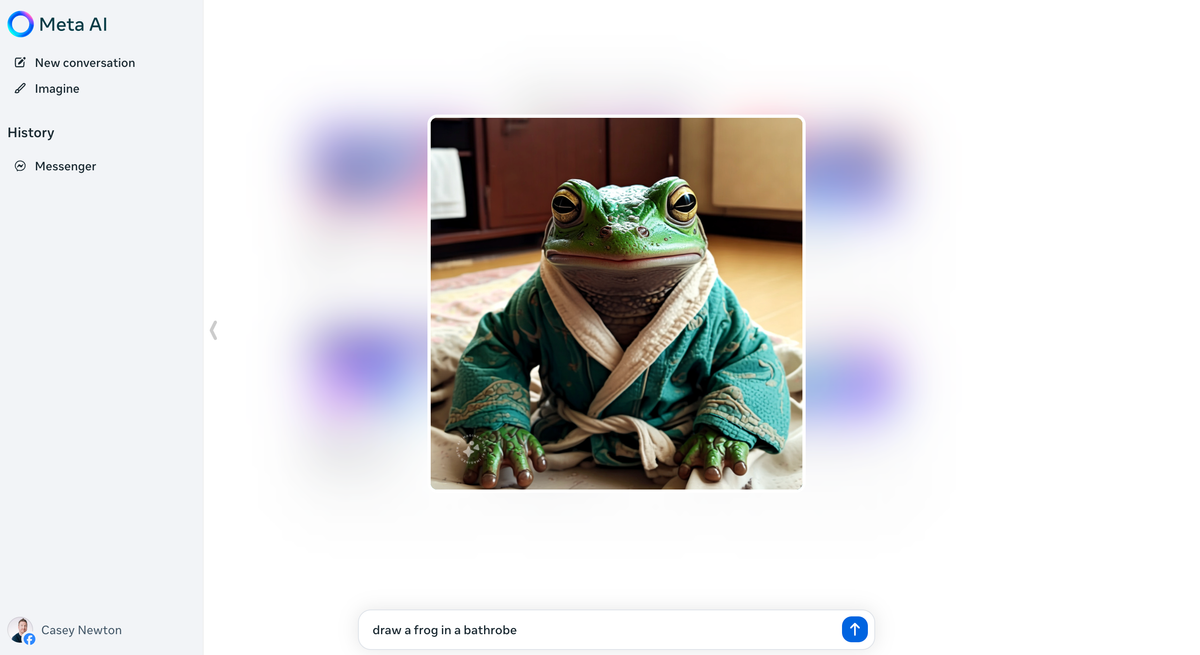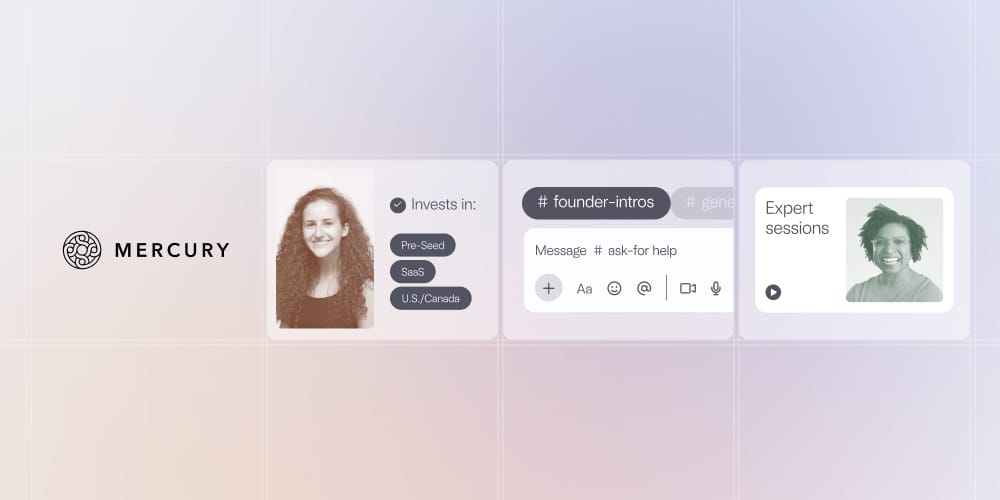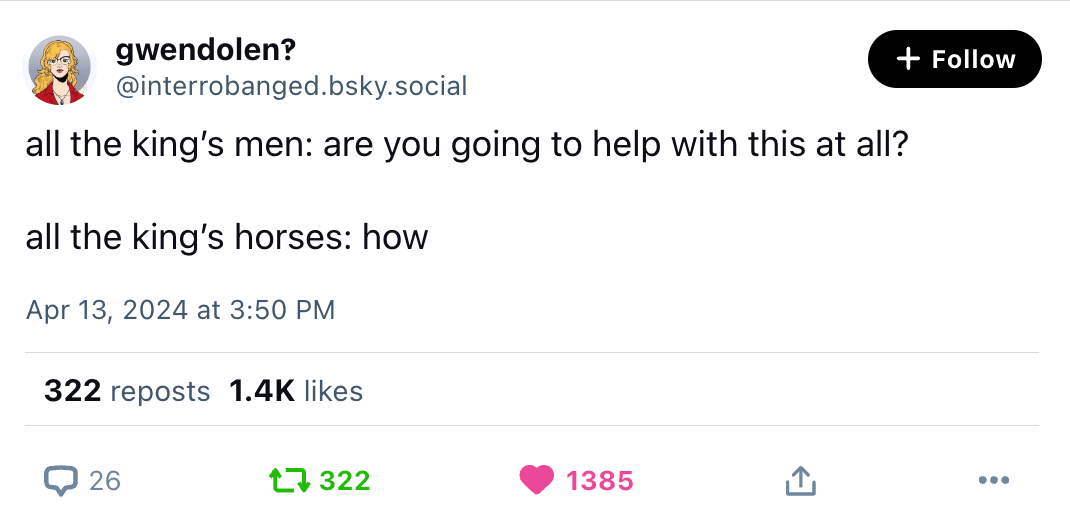|
Five ways of thinking about Llama 3, its latest large language model
Here's this week's free edition of Platformer: a look at the release of Meta's new large language model and what it portends for the future of social networks.
Do you value independent reporting on AI? If so, consider upgrading your subscription today. We'll email you all our scoops first, and you'll be able to discuss each today's edition with us in our chatty Discord server.
I. On Thursday, the AI hype train rolled through Meta's family of apps. The company's Meta AI assistant, a ChatGPT-like bot that can answer a wide range of questions, is beginning to roll out broadly across Facebook, Messenger, Instagram and WhatsApp. Powering the bot is Llama 3, the latest and most capable version of Meta's large language model. As with its predecessors — and in contrast to models from OpenAI, Google, and Anthropic — Llama 3 is open source. Today Meta made it available in two sizes: one with 8 billion parameters, and one with 70 billion parameters. (Parameters are the variables inside a large language model; in general, the more parameters a model contains, the smarter and more sophisticated its output.) A third model, which will be trained on more than 400 billion parameters, is still being trained, CEO Mark Zuckerberg said. OpenAI has never revealed the number of parameters in GPT-4, but analyses have suggested that it may be around 1.8 trillion. Like all of Meta's open-source efforts, Llama 3 is a lot of different things at once. It's a developer relations program and a way to recruit top engineers. It's a response to competitive pressure and a potential new source of revenue. It's a major new tool for collecting data. It's a shot in the dark. Meta has a lot to say about Llama 3's performance on various AI benchmarking tests — but nothing, as The Verge noted, to say about GPT-4. The company primarily wants to benchmark itself against smaller models rather than acknowledge comparisons with top performers — even as Zuckerberg says that "Our goal is to build the world's leading AI." Where Meta is arguably leading at the moment is in the quality of AI it is now offering for the cost — free —at a time when its top rivals are charging $20 a month for premium models. And with the introduction of its AI assistant into Facebook, Instagram, and WhatsApp, Meta may also now be leading in distribution. The company's apps have 3.19 billion daily users, and Meta will work to ensure that those users find reasons to consult its AI bots regularly. II. An AI chatbot inside Instagram or WhatsApp may not immediately seem useful. Those apps are for chatting with friends and family. What's the point of putting a bot there? There are other, more obvious places for drafting emails, doing light research, or cheating on your homework using AI. But — not for the first time! — Snap showed Meta the way. Last year, the company introduced an OpenAI-powered bot named MyAI into Snapchat. As Meta would later do, Snap let users bring AI into conversations with their friends, asking questions, drawing pictures, and so on. Initially, MyAi was available only to subscribers to Snapchat's premium product. But the company rolled it out to the entire 750-million person user base a few months later, and it was a hit. Within two months, 150 million users had sent the bot 10 billion messages, the company said. It helps them plan events, recommends restaurants, offers recipes, and more. MyAi had its share of detractors, too. But Snap proved out the use case. And a year later, Meta helped itself to the same idea. III. It's a feat of engineering to create high-quality LLMs with relatively few parameters, and to make them available to billions of people. And yet, I've seen Llama 3 do almost nothing that ChatGPT wasn't already doing in 2022. Earlier this year I wrote about the disastrous launch of Humane's Ai Pin and the broader hangover the tech industry is facing after the past 18 months of nonstop AI hype. The leap in quality from GPT-2 to GPT-3 had been exponential. From GPT-3 to GPT-4, less so. Everything since has felt incremental. The releases come more often, and the numbers on those benchmarking tests creep up a few percentage points each time. But new capabilities for consumers have been few and far between. AT&T once got in a modest amount of trouble for calling its cellular network "5G" when it was actually still 4G. AI model releases, I think, are starting to feel similar to the fake 5G era of mobile phones. The version numbers go up, but the use cases stay almost entirely the same. IV. One aspect of Llama 3 actually give me the old sensation of AI vertigo — the feeling that something new and unsettling is happening. Go to meta.ai and tell the bot to draw something. I chose "frog wearing a bathrobe." The image generates quickly. But that's not the impressive part. Go back into the prompt and change a word. Maybe the frog is now wearing a military uniform, or a cowboy hat. Within milliseconds of editing the prompt, a new image appears to match it. If you're used to the long stretches it can take ChatGPT to generate an image, Llama 3's performance is worth a look. V. Where is all of this going? No one knows for sure. But the steps Meta took today continue building the groundwork for something I wrote about here last year: the synthetic social network. In September, Meta had just unveiled 28 chatbots based on the likenesses of Kendall Jenner, MrBeast, Snoop Dogg, and other celebrities. It is a confusing product — Snoop Dogg's character is a dungeon master for a role playing game, for some reason? And most of the bots got little traction. (The fake Snoop Dogg barely has 14,000 followers; the real one has 86.7 million.) This week, though, the New York Times reported that Meta is taking the next step down this path: offering to let creators interact with their fans on its platforms via a chatbot trained on the way they speak. "Most of the messages would be sent automatically and would at least initially disclose that they were A.I.-generated," report Sapna Maheshwari and Mike Isaac. No one wants to talk to the Dungeons & Dragons chatbot that looks like Snoop Dogg. But they very well might want to talk to the Snoop Dogg chatbot in Snoop's actual Instagram DMs. And soon, they may have that chance. Instinctively, we might assume that people will hate this sort of thing. And yet the success of companies like Character.Ai and Replika — to say nothing of the rise of Shrimp Jesus on Facebook itself — suggest synthetic chats and media are about to become hugely popular. The first era of Facebook was for talking with friends and family. The second, TikTok-influenced era of the company is more focused on content from creators and other people you don't know. This week, we got a glimpse of the era yet to come: one where we interact regularly with both people and bots — perhaps not even always knowing, or caring, which one we are talking to. In recent months, conversations about the future of the internet rightly focused on how AI-generated text threatens to overwhelm the web. But for all that is impressive about Llama 3, its release offers a reminder that synthetic media is about to ooze into every corner of social products, too. And what happens after that is anyone's guess.
The TikTok ban is backEarlier this month, I wondered here what ever happened to the TikTok ban. Today, we have our answer: a bill that would require that ByteDance divest itself of the app is now set to be included in an aid package for Ukraine and Israel. Here are Steven T. Dennis and Sana Pashankar at Bloomberg: Speaker Mike Johnson plans to include TikTok divestiture legislation already passed by the House in a fast-moving aid package for Ukraine and Israel that the chamber is set to clear on Saturday. The Senate is expected to quickly take up the measure, and President Joe Biden promised Wednesday to sign it immediately.
If signed into law, the bill would deliver a significant blow to a video-sharing app used by as many as 170 million Americans. Its enactment would also mark a major setback to the company’s intense lobbying efforts, especially by Chief Executive Officer Shou Chew, who made the rounds on Capitol Hill last month in a bid to get the Senate to squelch the legislation. The bill reportedly got a new life when Sen. Maria Cantwell agreed to endorse it if it made certain changes designed to help it withstand legal challenges. Among other things, ByteDance would now have up to a year to divest TikTok, instead of the original bill's six months. Still, even if the bill does pass over the weekend, an intense legal battle is sure to follow. So whatever happens, this weekend's vote won't be the end of TikTok — but rather, the beginning of a brand-new fight.
Sponsored Make your business the best version of itselfAs a founder, you’re constantly balancing the day-to-day and working to realize the larger vision for your company. In a word, it’s complex. That’s why Mercury simplifies all your financial operations by powering them from the bank* account. Like you, Mercury pays attention to the details while keeping the bigger picture in mind. They go beyond banking and financial software to provide the resources you need to succeed. Raise is Mercury’s comprehensive founder success platform designed to do just that. With Raise, you can pitch hundreds of top-tier investors and land funding to grow, find camaraderie alongside a community of founders navigating similar challenges, and gather insights via a direct line to industry experts. Transform more than your finances — transform your company into the best version of itself. *Mercury is a financial technology company not a bank. Banking services provided by Choice Financial Group and Evolve Bank & Trust®; Members FDIC. Platformer has been a Mercury customer since 2020.
On the podcast this week: It's the music episode! For more than a year now, listeners have asked to listen to longer versions of the various Hard Fork themes in their entirety. This week, we're giving the people what they want: a whole show's worth of music, punctuated by some fun behind-the-scenes discussion with two of our talented composers, Dan Powell and Elisheba Ittoop. You'll also be able to find the tracks posted individually to YouTube, where you can enjoy lo-fi Hard Fork beats to study to whenever you like. Apple | Spotify | Stitcher | Amazon | Google | YouTube
Governing- A House hearing on an online data privacy bill found broad bipartisan agreement on Wednesday, but divisions remain over kids’ safety and data brokers. (Cristiano Lima-Strong / Washington Post)
- Canada is moving forward with a digital services tax on big tech companies starting in 2024, that would raise about $4.3 billion. (Reuters)
- The US AI Safety Institute appointed its head of safety – Paul Christiano, a former OpenAI researcher who some have criticized for being an “AI doomer.” So — the kind of person we actually do want working AI safety, then? (Ashley Belanger / Ars Technica)
- Google fired 28 employees who staged a sit-in protest of Project Nimbus, a $1.2 billion cloud contract with the Israeli government. (Alex Heath / The Verge)
- The National Guard is getting access to some of Google’s AI tools to analyze images of disaster areas and respond more effectively. (Gerrit De Vynck / Washington Post)
- YouTube hosted at least 100 videos with millions of views that advertised non-consensual deepfake porn tools, this review found. (Thomas Brewster / Forbes)
- Snap plans to add watermarks to AI-generated images on its platform, it said. (Ivan Mehta / TechCrunch)
- An AI-controlled jet successfully faced a human pilot during a test fight, the US Air Force said. But the military won’t say who won the dogfight between man and machine. (Emma Roth / The Verge)
- Scammers are now using face-swapping technology to carry out elaborate real-time romance scams. (Matt Burgess / WIRED)
- A spy site called Spy Pet is scraping data from Discord users – including messages – and selling access to it for as little as $5. (Joseph Cox / 404 Media)
- A new Colorado law extends privacy rights and the definition of “sensitive information” to neural data, which could prevent the sale of such data to tech companies. (Jonathan Moens / New York Times)
- A look at one author’s battle to copyright a book that she wrote with the help of ChatGPT. (Kate Knibbs / WIRED)
- AltStore PAL, a third-party app store for iOS, is now live in the EU. (Jon Porter and Thomas Ricker / The Verge)
- Meta and other tech companies should give users a free option to use their services without targeted advertising, the European Data Protection Board said. Cartoonish EU overreach here, given that they previously said Meta can’t meet the obligation here by charging a subscription fee. So that leaves … which business models, exactly? (Reuters)
- Microsoft’s $13 billion OpenAI deal will avoid a formal EU investigation after regulators found it did not amount to a takeover. (Samuel Stolton / Bloomberg)
- A group of hackers linked to Russia’s military intelligence unit Sandworm has claimed credit for targeting digital systems of water utility systems in the US, Poland and France. (Andy Greenberg / WIRED)
Industry- TikTok Notes, TikTok’s Instagram Rival, has started rolling out to select users in Australia and Canada for testing. (Sheena Vasani / The Verge)
- Women are increasingly sharing their experiences with abortion on TikTok, sharing practical information on how to get one amid legal restrictions. (Emily Schmall / New York Times)
- Documents reveal how Republican megadonor Jeff Yass and a Chinese real estate startup 99Fang kickstarted ByteDance, and eventually TikTok. (Mara Hvistendahl and Lauren Hirsch / New York Times)
- Google’s internal restructuring includes a new team called “Platforms and Devices,” dedicated to bringing AI to everything Android. (David Pierce / The Verge)
- Amazon Prime subscriptions just hit a new high of 180 million in the US, an 8 percent increase from last year. (Spencer Soper / Bloomberg)
- Despite scaling back its use, Amazon is licensing its “Just Walk Out” to other retailers. (Matt Day / Bloomberg)
- Amazon staff reportedly went undercover on Walmart, eBay and other marketplaces, disguised as third-party sellers, to gather intel on rivals. (Dana Mattioli and Sarah Nassauer / Wall Street Journal)
- OpenAI’s GPT-4 model has reportedly almost matched doctors in analyzing eye conditions, scoring about the same as all but top-scoring specialists in the field. (Michael Peel / Financial Times)
- Reddit CPO Pali Bhat is planning a suite of AI-powered product features, including a language translation feature. (Amanda Silberling / TechCrunch)
- Twitch is rolling out its TikTok-style feed to all users later this month. (Emma Roth / The Verge)
- Privacy-focused search engine Brave is adding AI-powered answers. Yet another browser undermining the economic foundation of the web it allegedly serves. (Ivan Mehta / TechCrunch)
- Triller, a TikTok rival, is merging with AGBA Holdings, creating a social media and financial services company worth $4 billion. (Daniel Tencer / Music Business Worldwide)
- A look at the seafaring industry that maintains undersea internet cables, and the mounting pressure from big tech companies to build and repair more while cost-cutting. (Josh Dzieza / The Verge)
Those good postsFor more good posts every day, follow Casey’s Instagram stories. (Link)
Do not make direct eye contact with your Cybertruck when washing it. Do not make any sudden movements. Make continuous soothing sounds to reassure it of its safety. Failure to exude warmth and love may result in damage to your Cybertruck. This damage is not covered by the warranty. — Dave Levitan (@davelevitan.bsky.social) Apr 17, 2024 at 10:56 AM
“Before you croque” was right there
[image or embed] — Jacob Harris (@harrisj.bsky.social) Apr 16, 2024 at 4:57 PM
Talk to usSend us tips, comments, questions, and Llama 3 vulnerabilities: casey@platformer.news and zoe@platformer.news.
|



